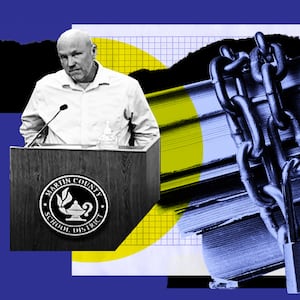As migrants cross the southern border into the United States, the children seeking asylum owe a debt to a young Salvadoran who has gone missing in Mexico just as he seemed about to win a landmark case in the American courts.
Hernan Portillo-Flores was just entering his teens in 2013 when an MS-13 gang leader known as El Palon began calling and texting his sister, Paola, who was then in the ninth grade.
As she started the 10th grade in January 2014, El Palon (“The Stick”) began showing up at the school’s front gate every day.
“Every time I would see him, I’d try to be with a group of people because I didn’t want to be by myself,” Paola Portillo-Flores would later testify in immigration court.
The gang leader continued texting.
“He was trying for me to fall in love with him,” the sister would testify. “He would say things like if I did not belong to him, I was not going to belong to anybody else. And if I did not accept what he wanted to do with me, he might kill my mother and/or my brother.”
She noted, “The entire neighborhood was afraid of him.”
Then came a day later in 2014 when El Palon approached her with a group of MS-13 members.
“He said to me, ‘It’s been a long time that you haven’t done anything to make me happy,’” she would testify. “He said, ‘You’re going to start seeing the consequences of the things that I’m capable of.’ He said, ‘In reality, if you love your brother and your mother, you’d better yield. Otherwise, something’s going to happen.’”
Paola had sought to spare her mother worry and had not said anything about her stalker, but the girl now told her everything. The mother arranged for Paola to leave the country immediately.
“He could have raped me or killed me,” Paola later testified.
The police were not an option. They had failed even to investigate after their stepfather was beaten, fatally shot in the forehead, and dumped in a well two years before for reasons that remained a mystery.
Paola departed for America on June 16 of that year, reaching an uncle in Virginia on Aug. 3.
“I fled from El Salvador in a very quiet way,” she later testified. Nobody “knew about it.”
But El Palon immediately noticed her absence. He and his crew approached her brother Hernan in the street.
“They stopped me and say to me, ‘Hey, we need to talk to you. We would like to talk to your sister. Can you tell us where she’s at or give us information about her whereabouts?’” Hernan later testified. “They had a firearm, they had knives… They said to me, ‘Our gang is so big and you’re going to get hurt.’”
Several days later, Hernan encountered them again.
“They said, ‘Okay, have you gotten the information that we asked you for?’” Hernan recalled.
The next several encounters were accompanied by escalating beatings. He, like his sister, sought to spare their mother from worry.
“My mother would say to me [that] my brother would get home without his shoes, beaten up, with bruises and even sometimes without a shirt, but my brother never told us what was happening,“ Paola would recall of phone reports from home. “He would say things like he was playing with his friends or he lost his shoes.”
Then came a particularly savage beating.
“I almost died on that occasion,” he recalled. “I had to tell my mom what was happening because she saw the bruises and the [injuries] that I had.”
The mother arranged for her son to live at a relative’s farm a two-hour drive from the city. He remained inside, fearful that somebody would see him and tip off the gang.
“I wouldn’t go anywhere because I did know the gang is very big,” he said.
He became even more fearful when his mother called to report four uniformed police officers had shown up at their home, asking for him. She told him she had peered past the cops and seen El Palon looking on with several gang members. She concluded that the cops were serving as the gang leader’s emissaries.
“The police were the ones asking questions to my mother, and they were asking questions about me,” Hernan recalled.
The mother and son decided that the time had come for him to head north.
“We knew that the gang is everywhere,” the sister would testify. “And sooner or later, they were going to find him. And they weren’t going to be using words any more. He was going to get murdered.”
Hernan crossed the border near Eagle Pass, Texas, as a 15-year-old unaccompanied juvenile in October 2015.
“He soon encountered U.S. Customs and Border Protection agents and admitted to illegally entering the country by crossing the Rio Grande,” court papers say.
Hernan was released to live with a relative as the Department of Homeland Security instituted deportation proceedings. He sought asylum on the grounds that he would be “harmed, tortured or killed” by MS-13 if he returned to El Salvador.
Hernan and his sister testified and an immigration judge deemed them both credible. But the judge denied the application, ruling that beatings and threats by a gang do not constitute persecution.
That made the danger no less dire when Hernan was deported back to El Salvador, where his mother had gone into hiding and MS-13 had taken over their onetime home. He sought refuge in Mexico while his immigration lawyer, Benjamin Osorio, doggedly continued the fight.
After the Board of Immigration Appeals (BIA) affirmed the immigration judge’s decision, Osorio brought the case to the U.S. Court of Appeals for the Fourth Circuit. He argued that his client’s age at the time of the encounter with El Palon should have been considered. The appeal was initially denied, but granted when Osorio took it en banc, to the full panel.
“Where a petitioner is a child at the time of the alleged persecution, the immigration court must take the child’s age into account in analyzing past persecution and fear of future persecution for purposes of asylum,” the court found. “Therefore, even if Petitioner’s beatings and the threats made against him would not rise to the level of past persecution for an adult, they may satisfy past persecution for a child.”
The ruling was soon applied by immigration judges in other cases involving children. The federal court kicked Hernan’s case back to the BIA, which returned it to the Immigration Court in February 2023.
Eight years after he arrived at the border, Hernan is likely just a quick hearing away from finally being accorded asylum.
“His case is regularly cited by [immigration judges] in the Fourth Circuit, so I imagine he will easily be granted asylum if we can find him,” Osorio, who is based in Virginia, told The Daily Beast.
The hitch was that Hernan had disappeared, having last been seen in Baja, Mexico.
Right up until January, he had been diligent about regularly checking in, but Osorio was then suddenly unable to contact him. The lawyer sought the help of human rights activists, non-profits, and a private detective, sending photos and a fingerprint card from when Hernan was detained at the border.
Osorio also contacted a client in Mexico who is seeking asylum in the U.S. as a transgender woman who was raped and threatened in Guatemala. She told Osorio that she had not heard anything about Hernan.
Nor had Hernan’s mother or sister or, it seemed, anybody.
“Mom is worried and I have had to talk her out of leaving El Salvador to go look for him in Mexico,” Osorio said.
Osario continued reaching out to anyone who might know something about this vanished client whose case is already easing the way for kids seeking refuge.
“I think I’m about to go myself,” he said in one text.







